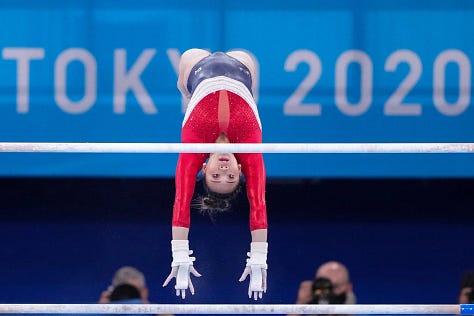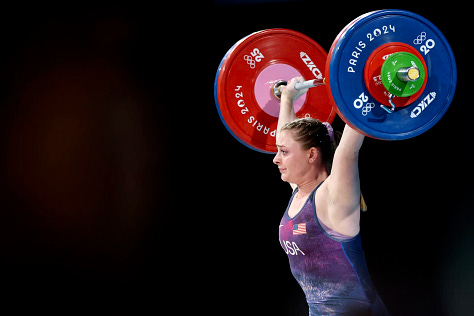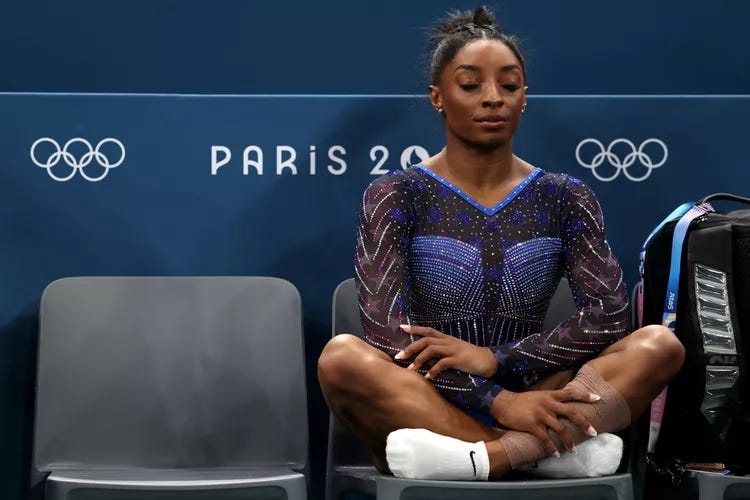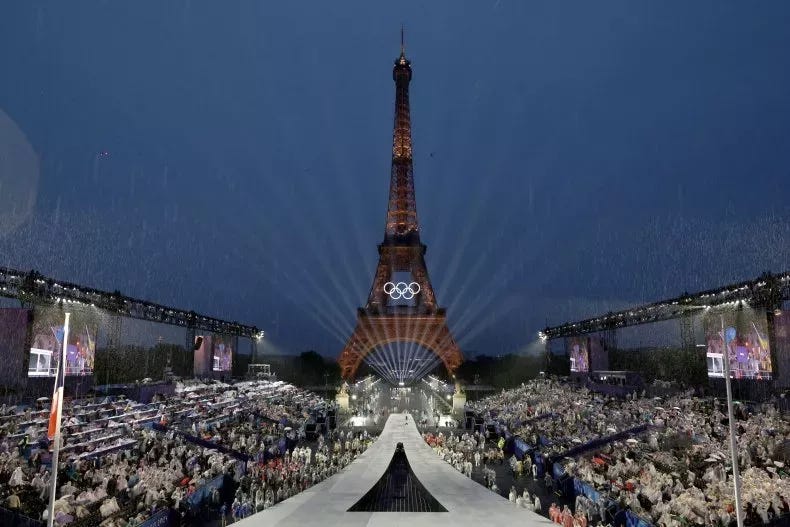What truly makes an Olympian?
How Simone Biles and Buddhism invites us to look deeply at ourselves and each other, past the surface of gold medals and our physical form
If you’re anything like me, you forked over $7.99 and signed-up for Peacock so you could have the Olympics running in the background these past two weeks.
I’m not much of a sports-person. I had my moments growing up — like staying up watching the Houston Rockets take the Championship in ‘94 and ‘95 or sitting in front of the television all afternoon to see how long Jeff Bagwell could stay in his super low squat stance.
There is inherently something human about sports — the drama, the build, the anticipation, the hope, the disappointment, the failure. It’s why the Olympics makes such damn good television!
I’ve been eating up all the meme-worthy moments and also disheartened (but not surprised) at how an athlete’s power was weaponized into hateful, anti-trans rhetoric. But my favorite moments have been watching the more unexpected categories — like artistic swimming (moonwalk?!) or breakdancing (Snoop Dogg introduction!) or how I was on the edge of my seat watching Zhendong sweat his face off for the ping pong battle for gold.
This past week, our usually quiet and serene home in the mountains, has been filled with very random “oh shit” and “holy moly” exclamations from yours truly. But seriously, how can you not react to these kayak guys doing full rolls in the Seine as they raced for gold?
When watching the Olympics, the first thing you notice is the physicality of the athletes like Olivia Reeve’s strength or Suni Lee’s flexibility or Sha’Carri Richardson’s speed. And when we talk about their character or mental attributes, it often comes down simply to being disciplined or determination like Steph Curry wanting to cement his legacy.



But one of the things Simone Biles has been a champion of is the journey of that discipline, the mental toll of training, and how self-sacrifice has been the culture of the Olympics for decades, if not centuries. In other words, do everything necessary to win the gold, to represent your country, to be the best in the world.
Biles has refuted and reclaimed that narrative after her very public battle with mental health during the 2020 Tokyo Olympics.
"We have to protect our mind and our body, rather than just go out there and do what the world wants us to do,” she said.
I have such mad respect for Biles for being such a champion of self-care. In the face of scrutiny and incessant criticism, she did what she needed to do to take care of herself and came back on fire this year, walking away with three gold and one silver medal.
Looking deeply at ourselves and each other

Biles’ invitation to think about the invisible work that goes into training for the Olympics reminds me of one of the core teachings of Buddhism — the five skandhas, or as Zen Master Thích Nhất Hạnh refers to it as the five aggregates.
The Five Aggregates is a principle in Buddhist philosophy that talks about what makes us who we are:
Bodily and physical forms
Feelings
Perceptions
Mental Formations
Consciousness
What Buddhism and Biles both teach us is that we are more than our physical forms — we are our sensations, our perspectives, our concepts, and of course the sum total of ourselves.
After the Tokyo Games, Biles said she suffered from the “twisties,” what trained gymnasts refer to when the body and mind are not in sync which she talks about in her Netflix documentary, Simone Biles Rising. She literally could not get her body to cooperate, function, making her gymnastics work impossible and dangerous. And she came to the insight and wise conclusion that it wasn’t worth risking her life trying to live up to everyone else’s expectations of her.
The concept of twisties is one I invite us all to think about — how often are our mind and bodies out of sync? Every day, for some people, that is the norm. This is where mindfulness comes in to help us be in our body and recognize all the things that are happening in this particular moment to make this present moment possible.
At the heart of the teachings behind the Five Skandhas is this idea that we are comprised of so many things — from our ancestors to Mother Nature. And what Simone Biles so strongly advocates for, that Buddhism teaches us is that we are so much more than our physical form, our achievements, our Instagram posts, etc. You name it, but it’s so easy for us as humans to define each other and our worth by what’s on the surface.
That discounts so much of who we are, what we have been through and what makes us human. And that’s neither fair, nor fun.
So this is my invitation to you: As you watch the Closing Ceremony or replays of the Olympics, use it as an opportunity to practice Looking Deeply — think not just about the physical feat of their accomplishments, but their character, their upbringing, their deep desires.
Sit with that.
Then reflect on all that you are, all the components, that make up your sense of self and how you are inherently part of this greater collective.
Contemplate on the Five Aggregates and think of all the ways in which they contribute to your sense of self and create your sense of reality. Make a list. Keep adding to it. It will be endless.
And I hope, like me, you marvel in it, that it gives way to an almost overwhelming sense of awe, allow that widening of the lens of humanity to bring in more spaciousness, compassion and gratitude.
Until then, here is a deeper teaching from Thầy on Looking Deeply.






love your deep looking!!